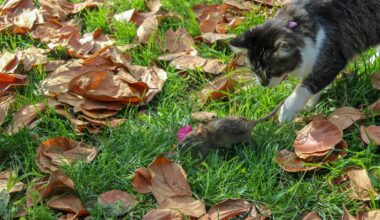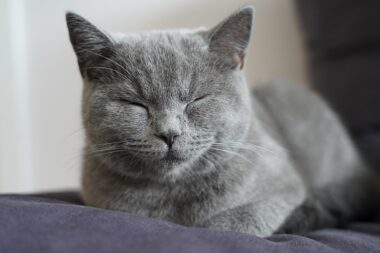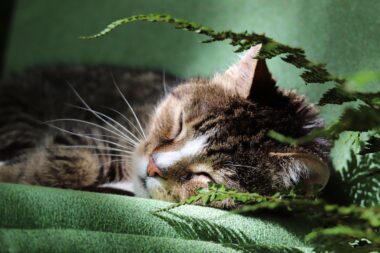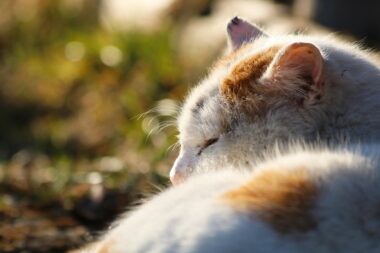How Nutrition Influences Cat Sleep Quality
Understanding how nutrition impacts sleep quality in cats is both fascinating and essential for pet owners. Just like humans, cats need a well-balanced diet to support their overall health, including sleep. Quality sleep is critical for their physical and mental well-being. A cat’s nutritional intake directly affects its energy levels, activity, and ultimately, sleep patterns. Essential nutrients, such as proteins, fats, vitamins, and minerals, play vital roles. Protein-rich foods can help build body tissue and support other bodily functions. On the other hand, carbohydrates can provide energy for daily activities. The timing of feeding can also influence sleep; feeding too close to bedtime might disrupt the cat’s sleep cycle. It’s crucial to observe how different diets affect individual cats, as tolerance can vary. Apart from the food type, considering the food’s quality is paramount, ensuring it is appropriate for the cat’s age, weight, and health condition. Tailoring nutrition can significantly enhance sleep quality. Providing a comforting environment is necessary for a good night’s sleep as well, combined with proper nutrition.
Cats are natural hunters and have specific dietary needs that influence their sleep. A diet that lacks essential fatty acids or certain amino acids can lead to restlessness and sleep disturbances. Cats primarily require taurine, an amino acid found in animal tissues, which can significantly impact heart health and sleep regulation. If cats do not get enough taurine, they may experience anxiety, which affects their ability to relax and enjoy restorative sleep. Foods high in omega-3 and omega-6 fatty acids can further support brain health and stress management. Research shows that a well-rounded diet improves behavior and reduces stress, promoting better sleep. Furthermore, hydration plays a vital role in nutrition; insufficient fluid intake may cause lethargy and discomfort during sleep. Encouraging water intake is vital, especially for dry food diets, as hydration affects kidney function and ultimately sleep cycles. Try to provide wet food options and fresh water daily. In addition to nutrition, plenty of mental and physical stimulation during the day helps cats sleep better at night. Engaging playtime reduces pent-up energy, allowing for more profound, more restful sleep.
Timing and Rituals
The timing of meals significantly influences a cat’s sleep patterns. Feeding schedules need to align with their natural instincts—cats are crepuscular, most active during dawn and dusk. When feeding is aligned with their natural activity periods, it can help establish a routine that promotes better sleep. Moreover, rituals associated with mealtime can set expectations that signal different phases of the day, such as relaxation and rest. For instance, a calming environment during feeding, along with soft music, can signal to the cat that it’s time to wind down. This can create a smoother transition from awake to sleep. Similarly, keeping consistent feeding times can help regulate their sleep cycles, rewarding them with a sense of security. As many pet owners have observed, minor changes in feeding habits can lead to noticeable variances in sleep behavior. Cats are creatures of habit, and any disruption in routine can cause anxiety or restlessness. Finding a balanced approach to meal timing can solve many sleep-related issues. Additionally, gradual changes in diet or feeding schedules are recommended to prevent any sudden disruptions to their well-being.
Adequate knowledge about specific food types is crucial in enhancing a cat’s sleep quality. Cat owners should consider a high-quality protein source, such as chicken, fish, or turkey, as the primary content in their foods. These sources are closer to a cat’s natural diet and can provide the necessary nutrients for improved health and sleep. In contrast, low-quality cat foods filled with fillers or by-products may lead to health issues that compromise sleep. Be vigilant when selecting foods for possible allergens, as sensitive cats may experience digestive issues affecting their overall comfort and sleep. Labels are essential for avoiding common allergens like beef, dairy, or wheat. Moreover, supplements rich in vitamins and minerals can enhance a cat’s diet, promoting better sleep quality. Cat owners can inquire about the appropriate options to enhance their cat’s diet with veterinarians. An increased awareness of metabolized nutrients may lead to better sleep patterns by affecting overall relaxation and comfort. Observing changes due to dietary adjustments can provide insight into a cat’s unique needs and what strategies work best for improved sleep.
The Role of Treats
Treats play a unique role in a cat’s overall diet, influencing sleep quality when utilized correctly. While treats can provide immediate gratification and bonding moments, they should be given in moderation. Overindulgence can lead to obesity and health problems that disrupt sleep. The types of treats are also significant; healthy options, such as small pieces of cooked chicken or specialized low-calorie cat treats, can serve as positive reinforcements without harmful side effects. Moreover, incorporating calming treats containing natural herbs, like valerian or chamomile, can further enhance sleep quality. These herbal options can provide additional relaxation effects and soothe anxious cats. During training or rewarding sessions, consider using treats as an opportunity to build associations with relaxation. For instance, providing treats in a designated calm area can help signal to the cat that it’s time to unwind. Remember that all treat options should align with overall dietary requirements. The focus on nutrition and treats can directly influence a cat’s state of being leading up to sleep, promoting a calm environment conducive to restfulness.
To enhance a cat’s sleeping environment, consider factors such as lighting and noise levels, as they interact with dietary habits. Cats are sensitive to their surroundings, and nutritional habits can affect how they adapt to various stimuli. For example, meals close to bedtime might leave a cat feeling overly stimulated, complicating the journey to sleep. Creating a calm, dark environment balanced with a peaceful sleeping space can help counteract these potential disruptions. Like humans, cats thrive in wellness-focused settings—introducing soft bedding, creating cozy hiding spots, and using gentle ambient sounds can contribute to a restful atmosphere for sleep. Additionally, behavioral practices, like ensuring a quiet wind-down period post-dinner, can support better sleep outcomes. A consistent nighttime routine signals that it’s time for relaxation, reinforcing a strong link between their food intake and sleep quality. Pay attention to external factors in the environment that might disrupt their sleep as well, such as loud noises or abrupt changes in light. Keeping a clean, comfortable space helps maintain a tranquil zone that is supportive of sleep, reinforcing the connection between a cat’s environment and quality rest.
Conclusion
In conclusion, nutrition heavily influences cat sleep quality, emphasizing the importance of a balanced and routine diet. From protein to vitamins, each nutrient plays a role in promoting health that correlates with well-being. Owners must pay attention to specific dietary requirements to meet each cat’s unique needs and adjust feedings accordingly. Regular assessments of a cat’s behavior and sleep should guide any changes in diet. Along with nutritious meals, creating a calm, safe environment is pivotal. Successful integration of these aspects will lead to improved sleep habits, increasing overall health and happiness. Understanding the nuanced relationship between nutrition and sleep highlights the unique nature of feline companions. It is essential to view these insights as part of a holistic approach to cat care and recognize that adequate nutrition involves a commitment to regular check-ins with veterinary guidance. Additionally, experimentation with meals, feeding schedules, and healthy treats can yield positive behavioral changes. Overall, investing in your cat’s nutrition has far-reaching benefits that extend beyond sleep quality—it fosters a deeper bond with them and enhances their quality of life.
Continually observing the relationship between diet and sleep reinforces this principle in cat ownership; making informed choices fosters a sound state of well-being.





